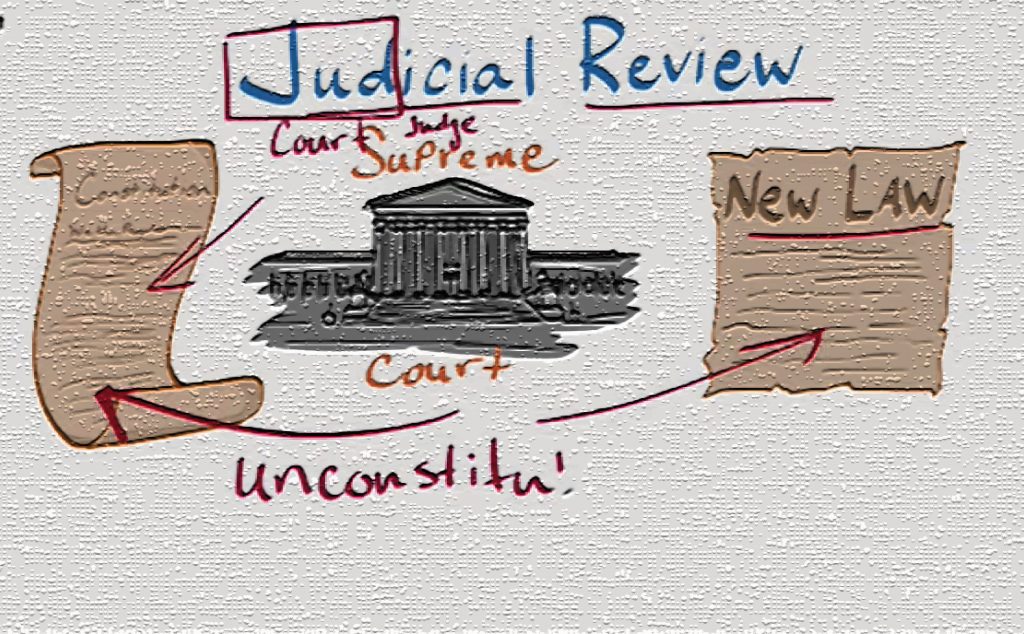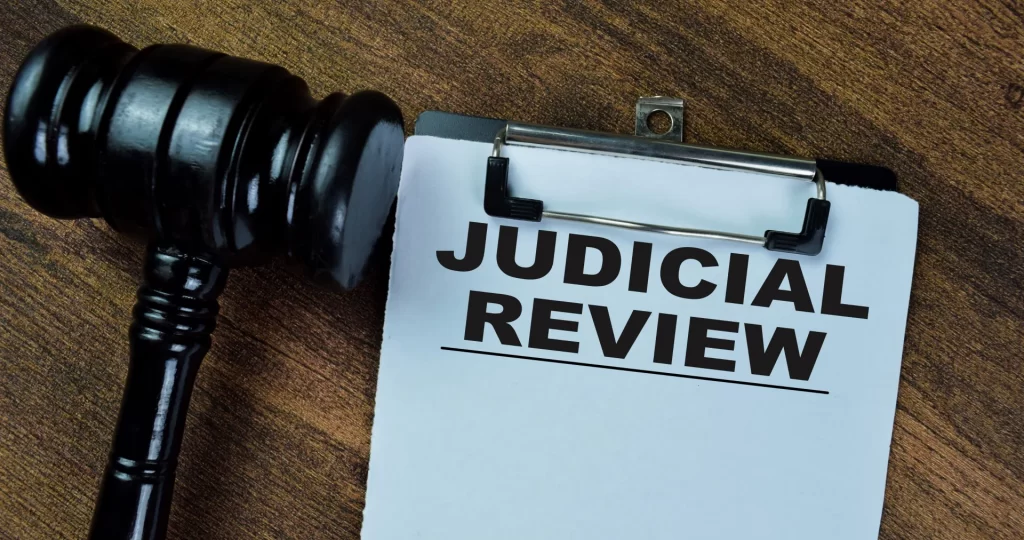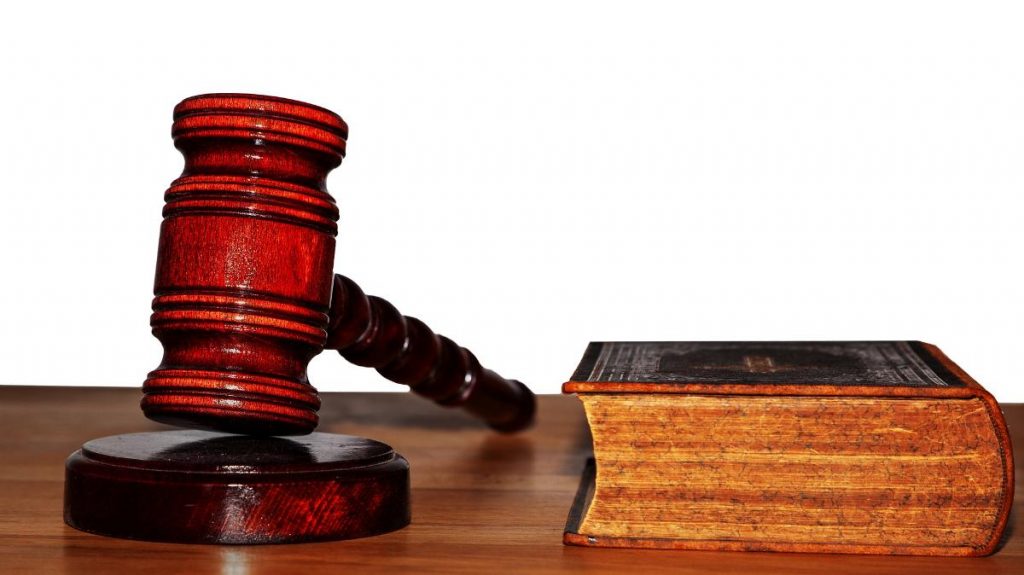Judicial Review
Judicial review is a fundamental aspect of the legal system in many countries, particularly those with a common law tradition. It refers to the power of a court to review and potentially invalidate laws, regulations, or governmental actions that are deemed to be inconsistent with a constitution or laws.
In essence, it allows courts to assess the constitutionality of legislative or executive actions. This process serves as a check on the other branches of government, ensuring they abide by the constitution and don’t overstep their authority.
The concept of judicial review is crucial in upholding the principle of constitutional supremacy, where the constitution stands as the highest law in the land, and no law or action should contradict it. Courts, through judicial review, can strike down laws or actions that violate constitutional principles.
This power often involves complex legal analysis and requires judges to interpret the law and constitution. It’s a significant aspect of the separation of powers, ensuring a system of checks and balances within a government.

What is a judicial review UK?
In the United Kingdom, judicial review is a process through which the courts scrutinize the lawfulness of decisions made by public authorities, including government ministers, local authorities, tribunals, and other bodies. This process ensures that these entities act within the powers conferred upon them by law and that they abide by legal principles.
Judicial review in the UK allows individuals, organizations, or other affected parties to challenge the decisions, actions, or omissions of public bodies if they believe these decisions are unlawful, irrational, unreasonable, or in violation of human rights. It’s important to note that judicial review doesn’t involve reevaluating the merits of a decision but focuses on the legality and procedural fairness of the decision-making process.
Cases brought for judicial review in the UK are typically heard in the Administrative Court, which is part of the High Court of Justice. If necessary, appeals can be made to higher courts, such as the Court of Appeal and the Supreme Court.
The grounds for judicial review in the UK include:
- Illegality: The decision-maker has acted beyond their legal powers or contrary to the law.
- Irrationality: The decision is so unreasonable that no reasonable decision-maker could have reached it.
- Procedural impropriety: Flaws in the decision-making process, such as bias, failure to consider relevant factors, or procedural unfairness.
- Breach of human rights: Actions that violate fundamental human rights protected by UK law or international conventions.
Judicial review plays a vital role in maintaining the rule of law and ensuring that public authorities act within their legal limits while also safeguarding individuals’ rights and freedoms.
What is the judicial review in Australia?
In Australia, judicial review refers to the process by which the courts review the lawfulness of administrative decisions made by government bodies, tribunals, and officials. This process ensures that these entities act within their legal powers and comply with the principles of administrative law.
The power of judicial review in Australia allows individuals and organizations to challenge administrative decisions on various grounds, including:
- Jurisdictional error: This occurs when a decision-maker exceeds their legal authority or acts outside the scope of their powers.
- Procedural fairness: Also known as natural justice, it involves ensuring that decision-making processes are fair, unbiased, and allow affected parties a reasonable opportunity to present their case.
- Error of law: The court can review decisions where the law has been incorrectly interpreted or applied by the decision-maker.
- Unreasonableness: This refers to decisions that are so unreasonable that no reasonable decision-maker could have reached the same conclusion.
Similar to the UK, judicial review cases in Australia are primarily heard in the Federal Court, state and territory Supreme Courts, and other specialized tribunals. If necessary, appeals may progress to higher courts, including the High Court of Australia, the country’s highest court.
Australia’s system of judicial review ensures the accountability of government bodies and officials, safeguards individual rights, and maintains the rule of law by scrutinizing administrative actions to ensure they comply with legal standards and principles.

What is an example of a judicial review in the United States?
One of the most famous examples of judicial review in the United States is the case of Marbury v. Madison in 1803. This case is significant because it established the principle of judicial review within the U.S. legal system.
In the final days of his presidency, John Adams appointed numerous justices of the peace, including William Marbury, through the Judiciary Act of 1801. However, when Thomas Jefferson assumed the presidency, his Secretary of State, James Madison, refused to deliver Marbury’s commission. Marbury then petitioned the Supreme Court to issue a writ of mandamus, a court order compelling Madison to deliver the commission.
Chief Justice John Marshall, in delivering the Court’s opinion, ruled that while Marbury was entitled to his commission, the Court did not have the authority to issue a writ of mandamus in this case. Marshall asserted that the portion of the Judiciary Act of 1789, which granted the Supreme Court this power, conflicted with the Constitution. He argued that the Constitution was the supreme law of the land and any law contrary to it was void.
Importantly, Marshall declared that it was the duty of the judiciary to interpret the Constitution and determine if laws or actions by the government were in accordance with it. This decision established the precedent for judicial review in the United States, affirming the Supreme Court’s power to declare acts of Congress unconstitutional if they violated the Constitution.
Marbury v. Madison remains a landmark case that solidified the principle of judicial review and the Supreme Court’s role in interpreting the Constitution to ensure the legality of governmental actions.
What is judicial review in Uganda?
In Uganda, judicial review is a legal process that allows the courts to review the actions, decisions, or omissions of public authorities or bodies to ensure they are lawful, constitutional, and within their powers. It serves as a mechanism to check and balance the exercise of power by government entities and to protect individuals’ rights against potential abuse by the state.
The Constitution of Uganda provides for the principle of judicial review, allowing individuals or organizations to challenge the legality of administrative actions or decisions. The grounds for judicial review in Uganda are similar to those in other legal systems and may include:
- Illegality: When a decision or action is made outside the legal authority or scope of power conferred upon the public authority.
- Procedural impropriety: This involves cases where the decision-making process was unfair, biased, or did not follow proper procedures.
- Unreasonableness: When a decision is so unreasonable that no reasonable authority could have made it.
- Violation of fundamental rights: Actions or decisions that infringe upon the fundamental rights guaranteed by the Constitution of Uganda.
Cases involving judicial review in Uganda are typically heard in the High Court. If necessary, appeals may proceed to the Court of Appeal and, ultimately, to the Supreme Court.
Judicial review in Uganda, as in many other legal systems, serves as an important tool for ensuring accountability, upholding the rule of law, and protecting individuals’ rights against arbitrary or unlawful actions by public authorities.
What happens after judicial review UK?
After a judicial review in the UK, several outcomes are possible depending on the court’s decision and the specifics of the case:
- Permission Granted: If the court finds merit in the case during the initial review and grants permission for a full hearing, the case will proceed to a substantive hearing. Here, the court will thoroughly examine the arguments and evidence before making a final decision.
- Judgment in Favor of the Claimant: If the court finds that the claimant’s arguments are valid and that the decision or action of the public body was unlawful, it might quash the decision or take appropriate actions to rectify the situation. This could involve ordering a re-evaluation of the decision, mandating the public body to reconsider the matter, or issuing specific directions to rectify the unlawful action.
- Judgment in Favor of the Defendant/Public Body: If the court rules in favor of the defendant or the public body, the original decision or action may stand, and the claimant’s challenge is dismissed. The court may affirm that the decision was lawful and within the authority of the public body.
- Appeal: Either party may appeal the court’s decision to a higher court, such as the Court of Appeal, if they believe there are legal grounds for challenging the judgment. This process involves a review of the legal principles applied in the initial judicial review rather than a re-examination of the facts.
- Costs and Remedies: The court may also decide on costs, which could involve ordering one party to pay the legal expenses of the other. Additionally, the court might determine appropriate remedies, such as compensation or specific actions to rectify the situation for the claimant if their challenge succeeds.
After a judicial review, the implementation of the court’s decision or any further legal actions largely depends on the specifics of the judgment and whether any appeals or follow-up actions are pursued by either party involved in the case.

What is the importance of judicial review in the UK?
Judicial review holds significant importance in the UK for several reasons:
- Checks and Balances: It ensures a system of checks and balances among the branches of government. By allowing the judiciary to review the actions of the executive and legislative branches, it prevents potential abuse or overreach of power.
- Upholding the Rule of Law: It reinforces the principle that everyone, including government bodies and officials, is subject to the law. It ensures that decisions and actions are made within the confines of the law and the Constitution.
- Protection of Individual Rights: Judicial review safeguards individual rights and freedoms by allowing individuals or groups to challenge decisions that may infringe upon their rights. This helps in maintaining a balance between state power and individual liberties.
- Ensuring Accountability and Fairness: It holds public authorities accountable for their actions. It ensures that decisions are made through fair processes, following proper procedures, and are based on relevant and reasonable considerations.
- Maintaining Constitutional Supremacy: It reinforces the principle that the Constitution is the supreme law of the land. Judicial review allows the courts to strike down laws or actions that conflict with constitutional provisions, ensuring the primacy of the Constitution.
- Legal Certainty and Stability: It contributes to legal certainty by providing a mechanism for resolving disputes about the legality of government decisions. This stability is crucial for the functioning of society and the economy.
Overall, judicial review plays a crucial role in maintaining a just and accountable system of governance, protecting individual rights, upholding the rule of law, and ensuring that governmental actions are conducted within the boundaries of legality and fairness.
What is judicial review in Ghana?
In Ghana, judicial review refers to the process by which the courts have the authority to review the actions, decisions, or omissions of public authorities or bodies to ensure they are lawful, constitutional, and within their powers. This process serves as a mechanism for checking and balancing the exercise of power by government entities and protecting individuals’ rights against potential abuse by the state.
The Constitution of Ghana provides for the principle of judicial review, allowing individuals or organizations to challenge administrative actions or decisions on various grounds, including:
- Illegality: When a decision or action is made outside the legal authority or scope of power conferred upon the public authority.
- Procedural impropriety: Cases where the decision-making process was unfair, biased, or did not follow proper procedures.
- Unreasonableness: When a decision is so unreasonable that no reasonable authority could have made it.
- Violation of fundamental rights: Actions or decisions that infringe upon the fundamental rights guaranteed by the Constitution of Ghana.
Cases involving judicial review in Ghana are typically heard in the High Court. If necessary, appeals may proceed to the Court of Appeal and, ultimately, to the Supreme Court.
Similar to other legal systems, judicial review in Ghana is vital for ensuring accountability, upholding the rule of law, and protecting individuals’ rights against arbitrary or unlawful actions by public authorities. It serves as a means to ensure that governmental actions and decisions align with legal standards and constitutional principles.

What is the Victorian judicial review?
In the context of Victoria, Australia, judicial review refers to the process through which the courts assess the lawfulness of administrative decisions made by government bodies, tribunals, or officials within the state of Victoria. This process is based on principles of administrative law and ensures that these entities act within their legal powers and comply with established legal standards.
Similar to judicial review in other parts of Australia, the Victorian judicial review involves:
- Reviewing Administrative Decisions: Courts in Victoria have the authority to review administrative decisions to ensure they are lawful, reasonable, and in accordance with procedural fairness. This includes examining whether the decision-maker stayed within the bounds of their legal authority, followed proper procedures, and acted reasonably.
- Grounds for Review: Judicial review in Victoria can be sought on various grounds, such as jurisdictional error (where the decision-maker exceeds their authority), procedural fairness (ensuring fair procedures were followed), errors of law, and unreasonableness of the decision.
- Courts Involved: Cases involving judicial review in Victoria are typically heard in the Supreme Court of Victoria or the Victorian Civil and Administrative Tribunal (VCAT). Appeals may proceed to the Court of Appeal and, if necessary, to the High Court of Australia.
The Victorian judicial review process is crucial in ensuring accountability, protecting individual rights, and maintaining the rule of law by subjecting administrative decisions to scrutiny and ensuring they align with legal standards and constitutional principles within the state of Victoria.
What is judicial review in Zambia?
In Zambia, judicial review is a legal process that allows the courts to review the lawfulness, constitutionality, and procedural fairness of decisions made by public authorities or bodies. This process serves as a mechanism to ensure that governmental actions are conducted within the bounds of legality and fairness, and that they comply with the Constitution and established legal principles.
The Constitution of Zambia provides for the principle of judicial review, allowing individuals or organizations to challenge administrative actions or decisions on various grounds, including:
- Illegality: When a decision or action is made outside the legal authority or scope of power conferred upon the public authority.
- Procedural Impropriety: Cases where the decision-making process was unfair, biased, or did not follow proper procedures.
- Unreasonableness: When a decision is so unreasonable that no reasonable authority could have made it.
- Violation of Fundamental Rights: Actions or decisions that infringe upon the fundamental rights guaranteed by the Constitution of Zambia.
Cases involving judicial review in Zambia are typically heard in the High Court. If necessary, appeals may proceed to the Court of Appeal and, ultimately, to the Constitutional Court.
Judicial review in Zambia, as in other legal systems, serves as an essential tool for ensuring accountability, upholding the rule of law, protecting individual rights, and ensuring that governmental actions and decisions comply with legal standards and constitutional principles within the country.
What is judicial review in Nigeria?
In Nigeria, judicial review is a legal process that allows the courts to review the lawfulness, constitutionality, and procedural fairness of decisions made by public authorities or bodies. This process serves as a mechanism to ensure that governmental actions are conducted within the bounds of legality and fairness, and that they comply with the Constitution and established legal principles.
The Constitution of Nigeria provides for the principle of judicial review, allowing individuals or organizations to challenge administrative actions or decisions on various grounds, including:
- Illegality: When a decision or action is made outside the legal authority or scope of power conferred upon the public authority.
- Procedural Impropriety: Cases where the decision-making process was unfair, biased, or did not follow proper procedures.
- Unreasonableness: When a decision is so unreasonable that no reasonable authority could have made it.
- Violation of Fundamental Rights: Actions or decisions that infringe upon the fundamental rights guaranteed by the Constitution of Nigeria.
Cases involving judicial review in Nigeria are typically heard in the Federal High Court, State High Courts, or specialized tribunals established for specific matters. If necessary, appeals may proceed to higher courts, such as the Court of Appeal and, ultimately, to the Supreme Court of Nigeria.
Judicial review in Nigeria plays a crucial role in ensuring accountability, upholding the rule of law, protecting individual rights, and ensuring that governmental actions and decisions comply with legal standards and constitutional principles within the country.

What is judicial review example in India?
An example of a significant judicial review case in India is the Kesavananda Bharati v. State of Kerala case in 1973. This case is often considered a landmark in Indian constitutional law as it fundamentally shaped the doctrine of basic structure.
In this case, the Supreme Court of India deliberated on the scope of Parliament’s power to amend the Constitution under Article 368 and whether there are any inherent limitations on this power. Kesavananda Bharati, a religious leader, challenged the Kerala government’s land reform laws, contending that they violated his fundamental rights.
The Supreme Court, in its decision, established the doctrine of the “basic structure” of the Constitution. It held that while Parliament has the authority to amend the Constitution, this power is not unlimited. There are inherent limitations, and Parliament cannot alter the basic structure of the Constitution. The court ruled that certain essential features, such as democracy, secularism, federalism, the separation of powers, and fundamental rights, form the basic structure and cannot be abrogated even through constitutional amendments.
This judgment is significant as it placed restrictions on the amending power of Parliament, preserving the core principles and values enshrined in the Constitution. It established a framework for judicial review in India, enabling the courts to strike down constitutional amendments that infringe upon the basic structure of the Constitution.
The Kesavananda Bharati case remains a landmark example of judicial review in India, demonstrating the judiciary’s role in safeguarding the foundational principles of the Constitution against potential abuse of power by the legislative branch.
Is judicial review a convention in USA?
Judicial review in the United States is not solely a matter of convention; it’s a constitutional principle that has been established through legal precedent and interpretation. The concept of judicial review, specifically the authority of the courts to review and invalidate laws or governmental actions that are deemed unconstitutional, was established in the landmark case of Marbury v. Madison in 1803.
In this case, Chief Justice John Marshall, writing for the Supreme Court, asserted the power of the judiciary to review the constitutionality of laws enacted by Congress. Marshall argued that it is the duty of the courts to interpret the Constitution and to ensure that laws passed by Congress adhere to the Constitution, which he declared as the supreme law of the land.
Since the Marbury v. Madison case, judicial review has been a fundamental aspect of the U.S. legal system. It’s rooted in the Supremacy Clause of the Constitution (Article VI), which establishes the Constitution as the supreme law of the land, and in the separation of powers doctrine.
Through subsequent Supreme Court decisions, the principle of judicial review has been reaffirmed and expanded upon, shaping the American legal landscape and providing a mechanism for the courts to uphold constitutional principles and strike down laws or actions that contravene the Constitution. Therefore, while not a matter of mere convention, judicial review is a constitutional principle firmly established in the United States.



